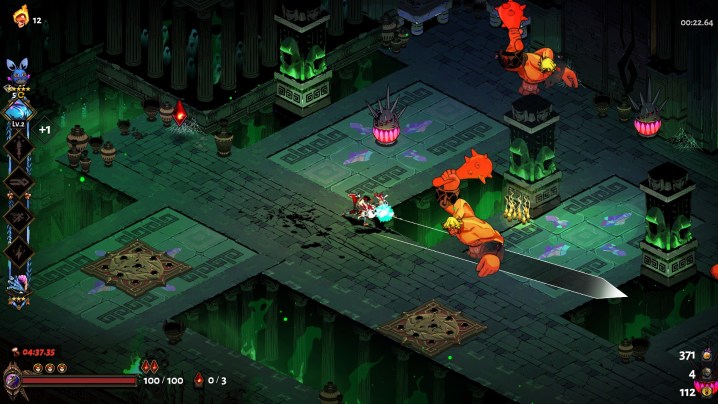Until recently, early access games — which allow players to buy, play and provide feedback on games during development — still had a bad rap in my mind. Half-baked games that took advantage of the process (like DayZ, Godus, and The Stomping Land) are what still came to mind whenever I’d see an early access label on Steam or the Epic Games Store. I’d refused to even play many early access games because I was worried they’d go unfinished or not live up to expectations.
I’m finally coming around though, and that’s thanks to two recent success stories. Hades, one of my favorite games of the past decade, and Baldur’s Gate 3, the Dungeons & Dragon RPG currently taking the gaming industry by storm, both started as early access games. Each came out of early access as such fully formed, enriching experiences that it’s begun to reshape my perspective on how powerful a tool early access can be.
The benefits of early access
I remember actively not being that interested in Hades back when it was announced in December 2018, and that was because it was an early-access title. The joke was on me; I felt like quite the fool when I finally got around to playing it at launch in 2020, and it became one of my favorite games of all time. I was in a similar boat with Baldur’s Gate 3, which I originally got access to on Google Stadia but didn’t play that much until its August 3 launch. Fool me twice and all that.

Now, I’m starting to more easily accept the strengths of the practice and what it can do for developers. It allows them to earn some revenue back earlier in the development process and lets them work with the community to balance and refine the game’s core ideas. While Larian Studios declined to discuss Baldur’s Gate 3’s early access process with Digital Trends, these sentiments are still reflected in the public early access messaging for games like Baldur’s Gate 3 and Hades.
“We’ve learned that working directly with our players during development makes our games better,” a now-deleted explanation of Larian’s early access reasoning on Baldur’s Gate 3’s Steam page explains. “RPGs this large, with so many permutations, thrive from feedback as new features and fixes are incrementally added to the game. Early Access gives players a chance to participate in development, and it gives us an opportunity to explore different game ideas with a live community. We want to learn how you play the game and use that to make it a better experience for everyone.”
This earnest messaging is common with early access titles, even failed ones. That’s ultimately why games that get abandoned in early access sting so hard. Fans feel like they’re getting in on the ground floor of the development of a fantastic game but are then screwed over by the team they invested in and trusted. That’s a worst-case early access scenario, but titles like Baldur’s Gate 3 and Hades took the exact opposite approach.
Both of those games have heaps of dialogue, deep RPG systems, and impressive player freedom — all things that require a lot of iteration and fine-tuning to perfect. Of course, they go about those things differently because Hades is a roguelike and Baldur’s Gate 3 is a CRPG, but the fact that both games have such player-focused systems made them prime candidates for early access. There’s no better way to playtest than by releasing the game to thousands of players.

Still, these games weren’t free of criticism while in early access. The buggy state of Baldur’s Gate 3 at its 2020 release, how it didn’t contain anything past Act 1, and the fact that no saves could be carried over were all sore points. A Screen Rant article from 2022 even theorized that “games like Baldur’s Gate 3 can spend years in early access, meaning that players who were excited about the game at first are more likely to grow bored of it by the time it is officially released.” It turns out that this kind of sentiment isn’t exactly true.
Games like Baldur’s Gate 3 can greatly benefit from years of early access, allowing for systems that feel even more intuitive and customizable than those in games players don’t have access to until day one. By gestating in early access for a few years, these experiences can feel even more finely tailored and get wider attention through word of mouth. And, as Baldur’s Gate 3’s success has shown, if the game is good, it will get a lot of attention, allowing those who played from day one in early access to feel like they were a pivotal part of a successful game’s journey.
In hindsight, it’s clear that I’d neglected tons of early access successes over the past several years. Lots of fantastic indie games have gone through the early access progress, like Darkest Dungeon and its sequel, Dave the Diver, Rogue Legacy 2, and Vampire Survivors. Even some games currently in early access are massive hits, like Valheim, Core Keeper, and Battlebit Remastered. Fortnite, one of the biggest games in the world, was in early access for years. While my own stigma is rooted in the program’s earliest days on Steam, the last several years have proven that we’re far past that outdated view of early access.
It doesn’t necessarily wipe away the sins of all the early access horror stories over the past decade. Still, games like Baldur’s Gate 3 and Hades stand as testaments to the strengths that can come from going down that path. Plus, they’ve given me a more open mind while approaching early access titles in the future. I’m now more likely to give upcoming games like Witchfire, Life by You, and Enshrouded my full attention throughout their early access periods. I’m more excited to watch games grow over time and hopefully get to experience the next Baldur’s Gate 3-level hit early.
Editors’ Recommendations








